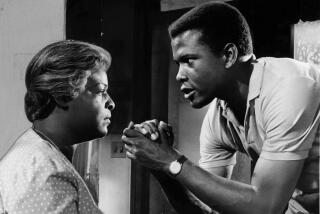Greek Actress, Politician Melina Mercouri Dies at 70 : Films: Famous for her ‘Never on Sunday’ role, lung cancer claims first woman to hold a senior Cabinet post in Athens.
- Share via
Melina Mercouri, the throaty actress who rocketed to international fame as the good-hearted prostitute Illya in “Never on Sunday” and went on to become Greece’s passionate minister of culture, died Sunday in New York. She was believed to be 70.
Mercouri, a heavy smoker who had been treated for lung cancer for the last five years, died of the disease. She underwent surgery last month to remove a tumor on her lung and slipped into a coma Saturday at New York’s Sloan-Kettering Cancer Center.
The first woman to hold a senior Cabinet post in Greece, Mercouri served as culture minister from 1981 to 1989 and returned to the post last October, when Andreas Papandreou’s Socialist government resumed power.
“Greece today mourns the death of Melina, a brave fighter, an important artist, a wonderful human being,” Prime Minister Papandreou said. “It laments the loss of a woman who through her art and her struggles made her name one with the name of Greece.”
One of Mercouri’s most ardent campaigns was for the return to Athens of the famous Elgin Marbles, priceless statues removed from the Parthenon in the early 19th Century and housed in the British Museum.
“I will never stop on the Elgin Marbles,” the fiery, green-eyed Mercouri declared last month.
“The marbles are part of a monument to Greek identity, part of the deep consciousness of the Greek people--our roots, our continuity, our soul. The Parthenon is like our flag,” she told The Times in 1983 after personally viewing the historic statuary in London.
“If you ask me will I be alive when they come back,” she said in 1988, “yes, I will be alive. And if I’m not alive, I will be reborn.”
Mercouri herself became something of a monument to Greek identity because of her remarkable political accomplishments and her successes on the stage and screen.
Her 1960 film “Never on Sunday,” by American director Jules Dassin, her husband, established the actress as a prototypal Greek and was credited with launching tides of tourists toward Greece.
The film won her the Best Actress Award at the 1960 Cannes Film Festival and an Academy Award nomination for what Variety termed “a brilliant execution of a larger-than-life character.”
Ironically, Mercouri was reluctant to take on the role of the hedonistic harlot who teaches a priggish American male tourist, played by Dassin, about life.
“I always thought of myself as a tragic--a serious--actress,” she said at the time. “I was sure I wouldn’t know how to go about playing comedy.”
Born into a wealthy Athens political family on Oct. 18 in years listed by various biographies as 1922, 1923 or 1925, Mercouri was christened Melina for the Greek word meli , or honey. The name was given to her by her devoted grandfather, who was mayor of Athens for three decades. Her father was a legislator and interior minister.
When her family objected to her interest in acting, at age 17 she married the wealthy older Athenian businessman Panayiotis Harokopos to escape their control. She enrolled in the Academy of the National Theater, where she spent three years studying classical Greek tragedy. Her marriage ended after a few years.
Mercouri began her career on stage, earning prominence with her role in Eugene O’Neill’s “Mourning Becomes Electra.”
She made her film debut in 1954 in the title role of “Stella” by the Greek director Michael Cacoyannis, which won her the Best Actress Award at Cannes in 1955.
Mercouri met Dassin at the 1956 Cannes Film Festival and began their long professional and personal partnership. Their first film was “He Who Must Die,” in which she had the role of Mary Magdalene.
The couple, who married in 1966, went on to “Never on Sunday,” then “Phaedra” in 1962 and “Topkapi” in 1964.
Although she disdained Hollywood, Mercouri made scores of films in Greece, France, Italy, Spain and the United States and graced stages throughout Europe and America. Among her other films were “A Man Could Get Killed” in 1966, “Promise at Dawn” in 1970 and “Once Is Not Enough” in 1975.
Mercouri swung from entertainment back to her political roots in 1967, when a junta took over Greece. Vociferously joining the resistance, she was stripped of her citizenship and her property and spent the next seven years living in exile in Paris and New York.
Within 48 hours after the junta was toppled in July, 1974, Mercouri was back in Greece. She helped to found Papandreou’s Panhellenic Socialist Movement.
She is survived by her husband, Dassin.
More to Read
Sign up for Essential California
The most important California stories and recommendations in your inbox every morning.
You may occasionally receive promotional content from the Los Angeles Times.












